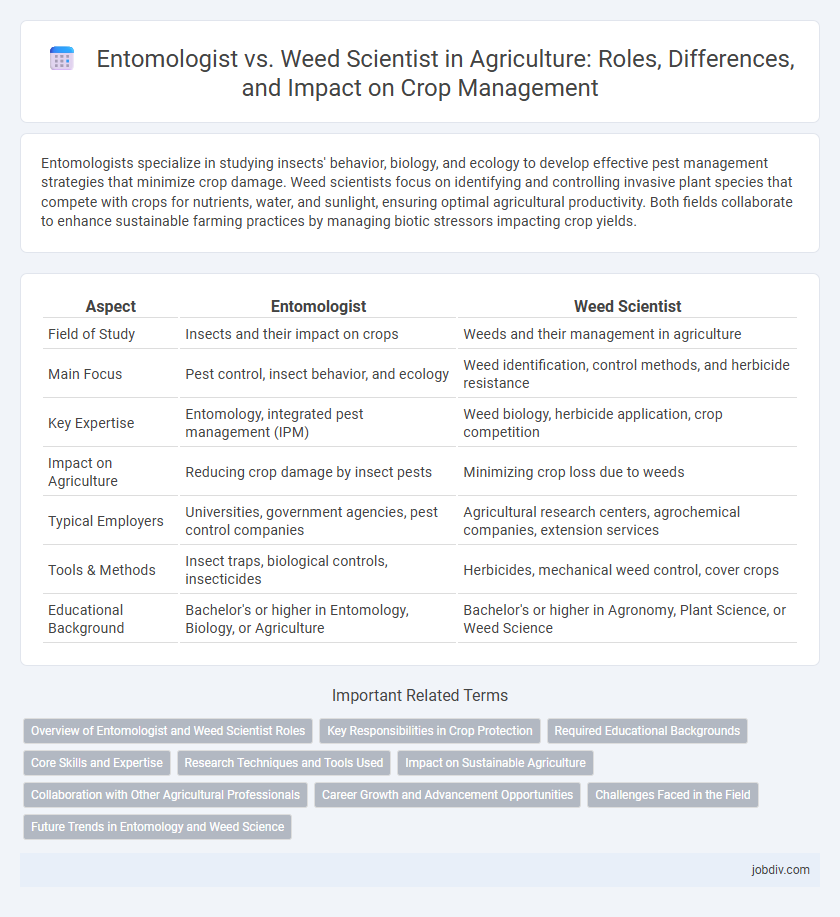Entomologists specialize in studying insects' behavior, biology, and ecology to develop effective pest management strategies that minimize crop damage. Weed scientists focus on identifying and controlling invasive plant species that compete with crops for nutrients, water, and sunlight, ensuring optimal agricultural productivity. Both fields collaborate to enhance sustainable farming practices by managing biotic stressors impacting crop yields.
Table of Comparison
| Aspect | Entomologist | Weed Scientist |
|---|---|---|
| Field of Study | Insects and their impact on crops | Weeds and their management in agriculture |
| Main Focus | Pest control, insect behavior, and ecology | Weed identification, control methods, and herbicide resistance |
| Key Expertise | Entomology, integrated pest management (IPM) | Weed biology, herbicide application, crop competition |
| Impact on Agriculture | Reducing crop damage by insect pests | Minimizing crop loss due to weeds |
| Typical Employers | Universities, government agencies, pest control companies | Agricultural research centers, agrochemical companies, extension services |
| Tools & Methods | Insect traps, biological controls, insecticides | Herbicides, mechanical weed control, cover crops |
| Educational Background | Bachelor's or higher in Entomology, Biology, or Agriculture | Bachelor's or higher in Agronomy, Plant Science, or Weed Science |
Overview of Entomologist and Weed Scientist Roles
Entomologists specialize in studying insects that impact agricultural ecosystems, focusing on pest management and beneficial insect behavior to protect crop health. Weed scientists investigate the biology and control of invasive and harmful weed species, developing integrated strategies to minimize competition with crops and improve yield. Both roles contribute critical research and practical solutions to enhance sustainable farming practices and ensure crop productivity.
Key Responsibilities in Crop Protection
Entomologists specialize in studying and managing insect populations that affect crops, focusing on pest identification, life cycle analysis, and developing integrated pest management strategies. Weed scientists concentrate on the biology, ecology, and control of weeds, implementing herbicide programs and cultural practices to minimize crop competition and yield loss. Both professionals collaborate to optimize crop protection by reducing pest and weed damage, thereby enhancing agricultural productivity and sustainability.
Required Educational Backgrounds
Entomologists typically require a bachelor's degree in entomology, biology, or a related field, often advancing to a master's or doctoral degree for research and specialized roles. Weed scientists usually hold degrees in agronomy, plant science, or weed science, with graduate studies enhancing expertise in weed control strategies and herbicide resistance management. Both fields emphasize strong foundations in biology and chemistry, with practical experience gained through laboratory work and field research.
Core Skills and Expertise
Entomologists specialize in the study of insects, focusing on pest behavior, insect taxonomy, and integrated pest management strategies to protect crops. Weed scientists possess expertise in plant biology, herbicide application, and weed ecology to control invasive species that threaten agricultural productivity. Both professions require strong analytical skills and knowledge of environmental impacts to develop sustainable farming practices.
Research Techniques and Tools Used
Entomologists employ specialized tools such as sweep nets, pheromone traps, and microscopes to study insect behavior, taxonomy, and pest management strategies in agricultural ecosystems. Weed scientists utilize field experiments, GIS mapping, and herbicide efficacy trials to analyze weed populations and optimize control methods. Both disciplines integrate molecular techniques and data analytics to enhance crop protection and yield sustainability.
Impact on Sustainable Agriculture
Entomologists contribute to sustainable agriculture by studying insect behavior and developing integrated pest management strategies that reduce reliance on chemical pesticides, thus preserving beneficial insect populations and enhancing crop health. Weed scientists focus on identifying and controlling invasive and resistant weed species through sustainable practices such as crop rotation, cover cropping, and selective herbicide use, minimizing soil degradation and promoting biodiversity. Both disciplines are crucial for optimizing crop yields while maintaining ecological balance and reducing environmental impact.
Collaboration with Other Agricultural Professionals
Entomologists and weed scientists collaborate closely with agronomists, crop consultants, and soil scientists to develop integrated pest and weed management strategies. Their multidisciplinary teamwork enhances crop health by combining expertise in insect behavior, weed ecology, and soil conditions, leading to sustainable agricultural practices. Effective communication and data sharing among these professionals optimize pest control measures and improve overall farm productivity.
Career Growth and Advancement Opportunities
Entomologists specializing in agriculture study insect behavior and pest control, with career growth often leading to roles in research, extension services, and integrated pest management programs. Weed scientists focus on controlling invasive plants and enhancing crop yields, frequently advancing into positions involving herbicide development, regulatory affairs, and sustainable weed management strategies. Both careers offer opportunities in academia, government agencies, and private sector agribusiness, with advancement driven by expertise in crop protection and environmental impact reduction.
Challenges Faced in the Field
Entomologists face challenges such as managing pesticide resistance in insect populations and predicting pest outbreaks influenced by climate variability. Weed scientists encounter difficulties in controlling herbicide-resistant weed species and developing sustainable weed management strategies to minimize environmental impact. Both fields require advanced research to adapt to evolving agricultural ecosystems and ensure crop productivity.
Future Trends in Entomology and Weed Science
Future trends in entomology emphasize the integration of advanced genetic tools such as CRISPR for pest management and the use of AI-driven monitoring systems to predict insect population dynamics. Weed science is progressively adopting precision agriculture technologies, including drones and hyperspectral imaging, to accurately detect and treat herbicide-resistant weed species. Both fields are converging on sustainable practices, leveraging bioinformatics and ecological modeling to reduce chemical inputs and enhance crop resilience.
Entomologist vs Weed Scientist Infographic

 jobdiv.com
jobdiv.com